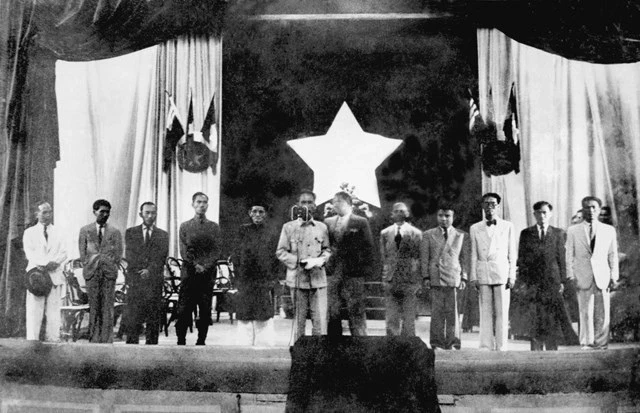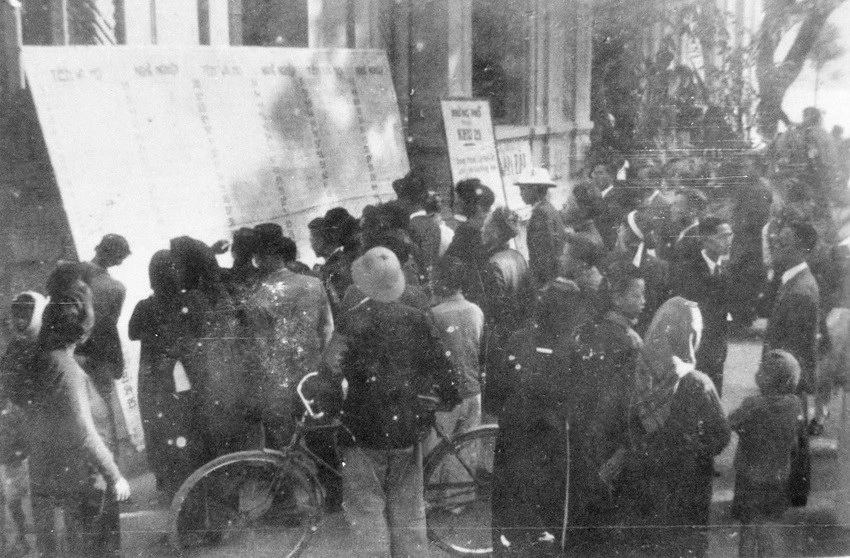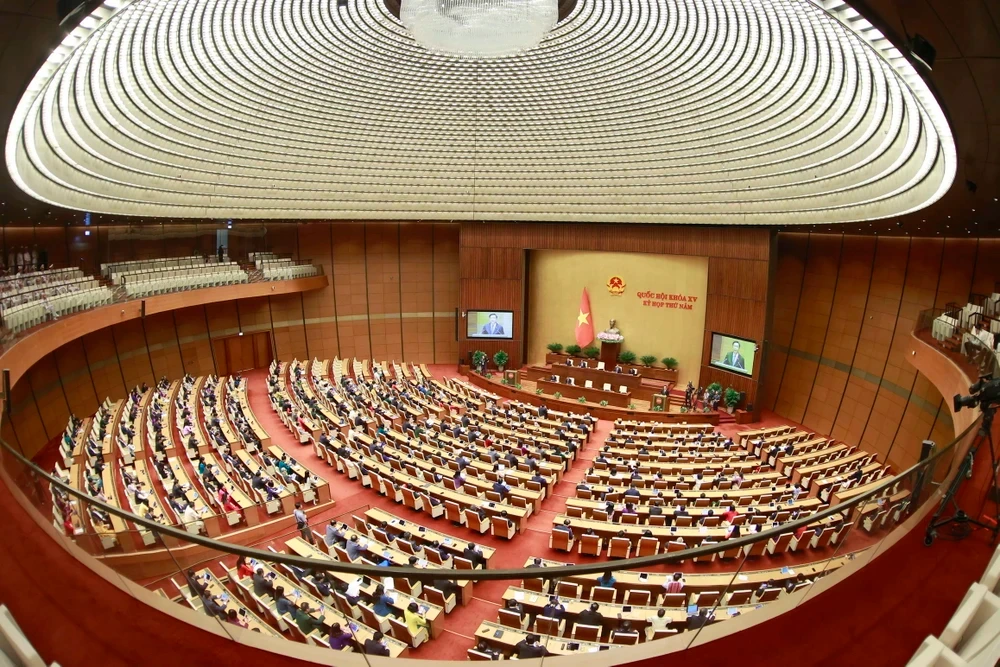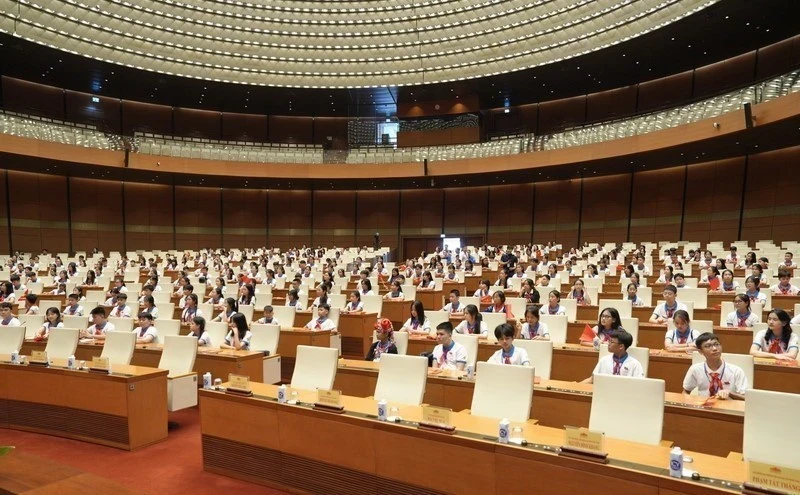Over the past 78 years, the National Assembly has always been close to and accompanied the nation, striving to fulfill its responsibilities as the highest representative body of the people and the highest State power body of Vietnam.

On January 6, 1946, the first general election to elect the National Assembly took place nationwide, conducted according to the most progressive democratic principles: universal, equal, direct and secret ballot, and was completely successful. The first National Assembly of the Democratic Republic of Vietnam (now the Socialist Republic of Vietnam) was born.
The General Election on January 6, 1946 marked a brilliant milestone in the process of building a democratic institution, legally affirming the mastery of the Vietnamese people.
The victory of the General Election marked the maturity of the Vietnamese revolutionary state, opening a new era for our country with a National Assembly, a unified Government, a progressive Constitution and a fully legal administrative system to represent the Vietnamese people domestically and internationally.

Since that historical milestone, up to now, after 78 years, the National Assembly has always been close to and accompanied the nation, striving to fulfill the responsibility of the highest representative body of the people, the highest State power body of the Socialist Republic of Vietnam.
The first National Assembly of the Democratic Republic of Vietnam (1st National Assembly) passed the 1946 Constitution. This was a democratic, progressive constitution, the first fundamental law that laid the foundation for building a revolutionary state institution in the new era.
Since the 2nd National Assembly up to now, in each historical period of the struggle for national liberation and reunification, as well as the process of building and developing the country, the National Assembly has been organized and operated according to the 1959 Constitution, the 1980 Constitution, the 1992 Constitution and the 2013 Constitution.
In particular, the 13th National Assembly (2011-2016) held elections on May 22, 2011 - the first time voters nationwide participated in the election of National Assembly deputies and People's Council deputies at all levels on the same day on a large scale. The election was a great success, electing 500 National Assembly deputies representing the great national unity bloc. The National Assembly voted to approve the full text of the 2013 Constitution draft at the 6th Session.
The 2013 Constitution reflects the spirit of profound innovation, creating a solid legal framework for the operation of the entire social life on the basis of democracy and the rule of law, and creating a strong driving force to promote the process of industrialization, modernization of the country and international integration; institutionalizing the Platform for national construction in the transitional period to socialism (supplemented and developed in 2011).

Implementing the Party's policy on innovation in the organization and operation of the National Assembly, with the attention and support of voters and people, inheriting from previous terms, the 15th National Assembly continued to innovate and improve working methods and achieved remarkable results in legislation, supervision, and decision-making on important national issues.
The National Assembly's working methods are always being innovated, improved, adapted and flexible to practical issues, especially during the COVID-19 pandemic. The National Assembly has made many strong improvements in the way it organizes and conducts National Assembly sessions, meetings of the National Assembly Standing Committee as well as the activities of the Ethnic Council, National Assembly Committees, National Assembly delegations and National Assembly deputies.
In particular, the application of information technology in the activities of the National Assembly has made a breakthrough, promptly adapting to the development trends of the times, creating an important premise to continue building and developing the e-National Assembly.
Over the terms, the activities of National Assembly deputies have increasingly had positive changes associated with innovations in the organization and operation of the National Assembly.
Along with that, the National Assembly continues to uphold the spirit of proactive legislation, creating development with a long-term vision. From the beginning of the term, supervision has been identified as a key and central content. Performing the supervision function well will have a positive impact on the implementation of legislative functions and deciding on important issues of the country. As of the 6th Session, the National Assembly agencies and relevant agencies have completed 114/137 legislative research tasks of the entire term of the 15th National Assembly (reaching over 83%).
In 2023, for the first time in its 78-year history, the Vietnamese National Assembly held the largest number of sessions in a year with 5 sessions, including 3 extraordinary sessions (2nd, 3rd, 4th) to review and promptly decide on 84 major and important issues, promptly meeting urgent practical requirements, contributing significantly to stabilizing and developing the country, promoting international integration, creating a premise to promote the implementation of tasks in 2024 and the following years.
The "extraordinary" sessions have become "normal" to properly and accurately meet the requirements of economic and social life and the legitimate aspirations of voters and people nationwide.
The National Assembly continues to thoroughly grasp the principle: Issues that require practicality, are clear, have been proven correct by practice, and have high consensus, must be resolutely implemented; issues that are unclear and have many different opinions must continue to be researched, summarized from practice, and piloted when authorized by competent authorities; policies that have been implemented but are not suitable must be researched, adjusted, and revised promptly.
An example of legislative work in 2023 is that with 12 million comments from voters and discussions at 3 sessions of the National Assembly, the draft Land Law (amended) still has a number of issues that need to be carefully and cautiously considered. The draft Law on Credit Institutions (amended) has been discussed at 2 sessions of the National Assembly, but there are still a number of issues that have not reached a high consensus.
Therefore, at the 6th Session, the 15th National Assembly decided not to pass these two draft laws, because these are two difficult laws, related to many fields, having a great impact on the economy and people's lives, requiring a special, unprecedented process to thoroughly consider all aspects. This decision of the National Assembly has received the consensus and high support of public opinion, demonstrating the cautious and responsible spirit of the National Assembly in legislative activities, always promoting quality and efficiency, not chasing quantity and progress.
2023 is a year of outstanding success for parliamentary diplomacy, with many vibrant, positive, diverse, comprehensive, and effective activities taking place on bilateral and multilateral levels. The National Assembly has strongly promoted its characteristics of both State diplomacy and profound popular character. The first mock session of the "Children's National Assembly" in 2023 is also one of the impressive events in the activities of the 15th National Assembly...

Recalling the first General Election, in his Opening Speech of the First Session of the First National Assembly of the Democratic Republic of Vietnam on March 2, 1946 at the Hanoi Opera House, President Ho Chi Minh affirmed: “This National Congress is the first in the history of our country Vietnam. It is the result of the General Election on January 6, 1946, and the General Election is the result of the sacrifices and struggles of our ancestors, it is the result of the heroic solidarity and struggle of all our Vietnamese compatriots, the solidarity of all compatriots regardless of age, big or small, including all religions, all ethnic groups on the territory of Vietnam, closely united into a block of sacrifice, not afraid of danger, fighting for independence for the Fatherland…”
Over the past 78 years, the National Assembly has always been the embodiment of the great national unity bloc, constantly innovating, improving the quality and efficiency of its operations to meet the requirements and tasks of each revolutionary stage, worthy of being the highest representative body of the people and the highest State power body.
According to VNA